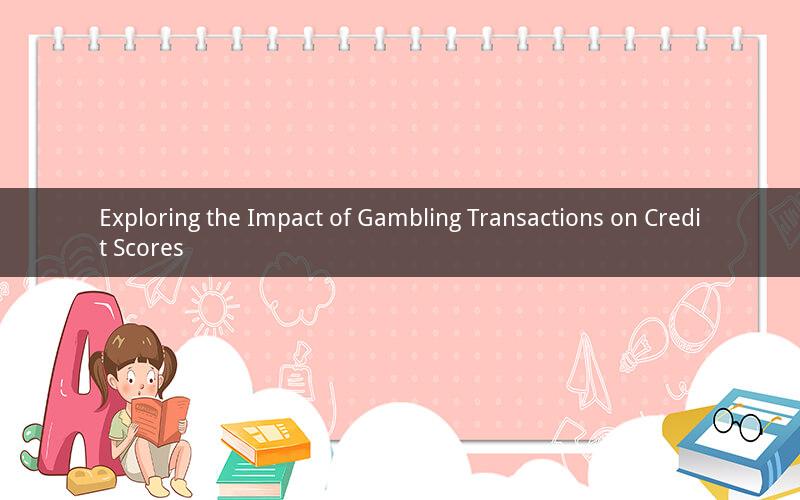
In recent years, the gambling industry has seen significant growth, with millions of people engaging in various forms of gambling. With the convenience of online platforms, it has become easier than ever to conduct gambling transactions. However, many individuals are concerned about the potential impact of these transactions on their credit scores. In this article, we will delve into the relationship between gambling transactions and credit scores, examining the factors that can affect your creditworthiness and providing tips to help you maintain a good credit score despite your gambling habits.
I. Understanding Credit Scores
A credit score is a numerical representation of an individual's creditworthiness. It is used by lenders, landlords, and employers to assess the risk associated with granting credit, renting property, or hiring employees. Credit scores range from 300 to 850, with higher scores indicating lower risk. The most widely used credit scoring model in the United States is the FICO score, created by the Fair Isaac Corporation.
II. The Relationship Between Gambling Transactions and Credit Scores
While gambling transactions themselves do not directly affect your credit score, certain indirect factors can influence your creditworthiness. Here's how gambling transactions can impact your credit score:
A. Debt Accumulation
Gambling can lead to significant debt, as individuals may take out loans or credit card debt to finance their betting activities. Accumulating high levels of debt can negatively impact your credit score. High debt-to-income ratios, which compare your total debt to your income, can signal to lenders that you may struggle to manage your financial obligations.
B. Late Payments
If you're using credit cards to fund your gambling transactions, late payments can significantly damage your credit score. Late payments are considered a major factor in determining your creditworthiness and can lower your score by up to 110 points.
C. New Credit Applications
Opening new lines of credit, such as taking out a personal loan to cover gambling losses, can also impact your credit score. Applying for new credit accounts for 10% of your FICO score and can temporarily lower your score as a result of the credit inquiries.
D. Public Records and Collections
In the event that you're unable to repay gambling-related debts, these may be reported to a collection agency or result in a public record, such as a judgment or bankruptcy. These negative marks can significantly lower your credit score and persist for several years.
III. Maintaining a Good Credit Score Despite Gambling Transactions
If you're concerned about the potential impact of gambling transactions on your credit score, consider the following strategies to maintain a good credit score:
A. Monitor Your Credit Regularly
Checking your credit report regularly can help you identify any issues early on and take corrective action. You can obtain a free credit report from each of the three major credit bureaus (Equifax, Experian, and TransUnion) once a year at AnnualCreditReport.com.
B. Pay Off High-Interest Debt
If you're carrying high-interest debt from gambling, focus on paying it off as quickly as possible. This will help lower your debt-to-income ratio and improve your credit score.
C. Avoid Late Payments
Make sure to pay all your bills on time, including gambling-related debts. Late payments can have a severe impact on your credit score and are often difficult to recover from.
D. Keep Credit Utilization Low
Credit utilization is the percentage of your available credit you're using. Try to keep your credit utilization below 30% to maintain a good credit score.
E. Diversify Your Credit Mix
Having a diverse credit mix, such as a mix of credit cards, loans, and mortgages, can help improve your credit score. As long as you manage these accounts responsibly, they can contribute positively to your creditworthiness.
F. Consider Debt Consolidation
If you're struggling to manage multiple gambling-related debts, consider a debt consolidation loan to combine these debts into one monthly payment. This can simplify your financial obligations and potentially lower your interest rates.
IV. Conclusion
While gambling transactions themselves do not directly affect your credit score, the resulting debt and financial challenges can have a significant impact. By managing your gambling habits responsibly and taking steps to maintain a good credit score, you can mitigate the potential negative effects on your creditworthiness. Remember, your credit score is a reflection of your financial health, and it's essential to monitor and manage it diligently.
Questions and Answers:
1. Can gambling transactions alone affect my credit score?
Gambling transactions themselves do not directly affect your credit score. However, the resulting debt and financial challenges can indirectly impact your creditworthiness.
2. What if I'm using a credit card for gambling transactions?
If you're using a credit card for gambling transactions, it's essential to monitor your spending and ensure you can pay off the balance in full each month. High credit card debt and late payments can damage your credit score.
3. How long do gambling-related debts stay on my credit report?
Gambling-related debts that result in collections or public records can stay on your credit report for up to seven years.
4. Can I dispute gambling-related debts on my credit report?
Yes, you can dispute gambling-related debts on your credit report if you believe they are inaccurate or incorrect. Contact the credit bureaus to start the dispute process.
5. Is there a way to rebuild my credit score after gambling-related debt?
Rebuilding your credit score after gambling-related debt is possible by taking steps to pay off your debts, making timely payments, and maintaining a good credit utilization ratio. Consider seeking financial counseling or credit repair services for additional support.